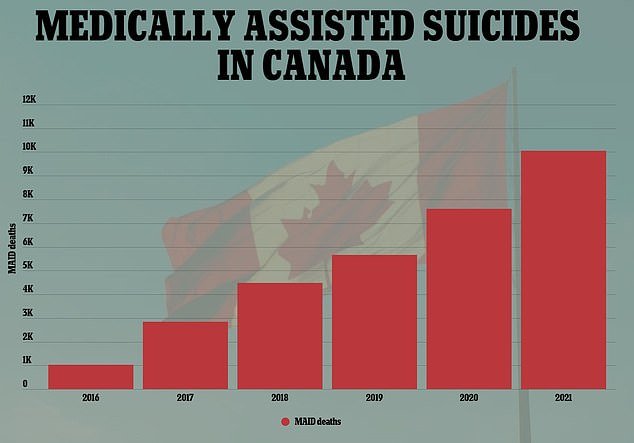The Daily Observer London Desk: Reporter- John Furner
Canada is due to legalize euthanasia for people addicted to drugs next year in a move activists are comparing to ‘eugenics’.
When the country’s law around medically assisted dying (MAID) changes in March 2024, mental health patients, including those with substance abuse issues, with no physical ailments will be able to seek assisted suicide.
A special parliamentary committee in the coming months is due to re-scrutinize the move ahead of the rollout, following differing opinions between political parties in Canada.
More than 10,000 Canadians were euthanized in 2021, a tenfold increase over 2016 when the practice was legalized. Some cases have involved people experiencing poverty wanting to die.
MAID became legal in Canada in 2016. Since then, the rules around who is eligible have been relaxed several times – and rates have increased tenfold to around 10,000 cases in 2021
The process for an assisted death in Canada starts with downloading a form online.
This involves the applicant answering a series of tick box questions and signing the bottom, followed by securing the signature of witnesses. There will then be a phone call and home visit from a doctor.
If the application is approved by two separate doctors, the person must wait 90 days from the time of their application, and then a doctor can administer the lethal drug via injection.
Currently, people solely with mental illnesses such as depression and personality disorders with no physical conditions are not eligible for assisted suicide.
A framework for assessing people with substance use disorders for MAID is being discussed at an annual scientific conference held in Canada this week.
The agenda for the workshop includes teaching attendees and medical professionals how to ‘know the difference between suicidality and a reasoned wish to die.’
Dr David Martell, physician lead for Addictions Medicine at Nova Scotia Health, who is presenting the framework at the conference, told VICE News: ‘I don’t think it’s fair, and the government doesn’t think it’s fair, to exclude people from eligibility because their medical disorder or their suffering is related to a mental illness.
‘As a subset of that, it’s not fair to exclude people from eligibility purely because their mental disorder might either partly or in full be a substance use disorder. It has to do with treating people equally.’
Dr Martell said suicidality might be linked to a severe, sudden crisis or be seen in someone with a long-term psychiatric condition.
Someone with a reasoned wish to die would be someone ‘thinking in a calm and measured way about wanting [their] suffering to end, being able to reason through it.’
He added people can show signs of both, making it difficult to assess. Plus, it would be ‘fairly impossible’ to make a distinction if the person was under the influence of drugs or alcohol, he said.
At the moment, people are eligible for MAID if they have a ‘grievous and irremediable medical condition’, for instance a serious illness or disability, that has left them in irreversible decline.
To be approved for MAID, people must go through two assessments from independent healthcare providers.
Zoë Dodd, a Toronto-based harm reduction advocate, told VICE News the practice equates to eugenics.
She said: ‘I just think that MAID when it has entered the area around mental health and substance use is really rooted in eugenics.
‘And there are people who are really struggling around substance use and people do not actually get the kind of support and help they need.’
Drug users and harm reduction advocates also told VICE News they think public health methods such as improved access to overdose prevention sites and medications like methadone, used to treat opioid use disorder.
They said a regulated drug supply, more housing and job opportunities would also help, they said.
Dr Martell, who has been a MAID provider himself since 2016, agreed that health care options for people with substance use disorders are underfunded.
He said he has not heard a desire for assisted death among his patients with substance use disorders and told VICE: ‘The idea that we might promote or push this on people, that doesn’t resonate with me at all.’



